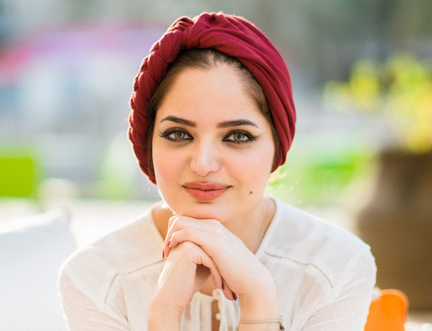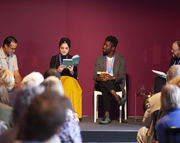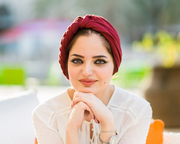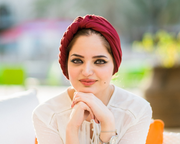Only the Freedom of Fiction is Certain
By Shahad Al Rawi

In 2018, we commissioned 51 authors from 25 countries to write essays exploring ideas about freedom for The Freedom Papers, a publication produced in partnership with Gutter Magazine. Read on for Shahad Al Rawi's essay (in both Arabic and English), and visit guttermag.co.uk to purchase a copy of The Freedom Papers.
في المشهد الأخير من فيلم ( القلب الشجاع) مستعيناً بما تبقى لديه من قوة أطلق وليام والاس كلمة: حرية. الفيلم الذي أدى بطولته ميل غيبسون عرض في منتصف التسعينيات من القرن الماضي، وبثته (قرصنته) في نفس الفترة محطة تلفزيون عراقية شبه حكومية. كان بلدي العراق في ذلك الوقت يعيش حصاراً هو الأقسى من نوعه في التاريخ الحديث. بسبب هذا الحصار مات أكثر من الف٥٠٠ عراقي في الأقل، معظمهم من الأطفال، وأعترفت بذلك السيدة مادلين أولبرايت وزيرة الخارجية الأمريكية حينها لمحطة تلفزيون اسبانية قائلة: إن هذا الرقم يعد معقولا من وجهة نظر إدارتها. كنت في التاسعة من عمري حين شاهدت هذا الفيلم مع عائلتي، وكانت هذه أول مرة في حياتي أسمع فيها كلمة (حرية) بهذه القوة الدرامية مقترنة بلحظة موت بطل وسيم.
بقيت (الحرية) تحمل معناها السياسي طويلا في ذاكرتي. بعد ذلك بثمان سنوات وجه السيدان دبليو بوش وتوني بلير رسالتين إلى الشعب العراقي يعدانه بالحرية والخلاص من النظام الدكتاتوري وفي ٩ أبريل عام ٢٠٠٣ تم إجتياح بلدي من أجل حريته.
موضوع روايتي الأولى ( ساعة بغداد) التي أثارت وتثير جدلا متواصلا في الأوساط الأدبية في العراق وخارجه ( هي الآن مرشحة للقائمة القصيرة لأرفع جائزة أدبية في اللغة العربية) جرت أحداثها في هذه الفترة تحديداً، وأعني فترة الحصار وفترة لقاء الحرية بالأحتلال وهما يتجولان في شوارع العاصمة التي ولدتُ فيها قبل تسع سنوات من عرض فيلم (القلب الشجاع).
لم يكن بوسع عراقي واحد أن يملأ صدره بالهواء ويصرخ بكل قواه: (حرية) ذلك أن ضجيج مرور الدبابات الأمريكية كان سيحول دون أن يسمعه أحد ما. زمن الحرية بمعناها السياسي المرتبط بفكرة الوطن، أي التخلص من المحتلين، أضحى في عالمنا الحديث مجرد مادة للافلام التاريخية. الحرية نفسها أخذت معان جديدة في حياتنا، وعندما قررت أن أكتب روايتي وجدتها تسكن في أعماقي، لا تحتاج للتعبير عنها الى تلك الصرخة المدوية. تحتاج أن أجلس على طاولتي وأكتب. عليّ أن أراوغ القوى الجديدة التي أطلقها الأحتلال وأكتب. فعندما إنهارت الدولة العراقية وإنتهت قبضة الدكتاتورية ورقابتها، إنبثقت من الماضي قوى تقليدية لتأخد مكانها وتفرض شروطها الأجتماعية والأخلاقية، التي تستمدها من قوانين ليست مدنية بأي حال من الأحوال. حرية الذئاب تعني الموت الحتمي للحملان كما يقول أحد المفكرين البارزين في عصرنا، وهي بهذا المعنى، حرية نسبية لا تحيل إلى معنى متعال ثابت وجوهري. حرية بحاجة إلى توضيح.
في بلدي هذا اليوم، لديك حرية كافية لتطلق على يوم ( ٩ أبريل ٢٠٠٣) عنوانين تناسب وجهة نظرك وموقعك من الحدث: التحرير، الأحتلال، سقوط بغداد، الأجتياح وغيرها من الأسماء. عبّرت عن هذا المعنى في روايتي، ووجدت أحد النقاد البريطانيين يتهمني بأنني مغرمة بتفكيكة جاك دريدا حيث الكلمات لا تشير بالضرورة إلى الواقع.
قرأت في سير العديد من الكتاب وفي مقابلاتهم الصحفية تأكيدات على شرط الحرية في أي عملية إبداعية، وأنا أتفق معهم تماماً، لكن ما هي هذه الحرية؟! هل يمكننا أن نعيش أحراراً خارج الثقافة التي ولدنا بداخلها، هل يمكننا تشكيل رؤية شخصية منزهة عن الوجود والمعرفة والقيم دون أن ننطلق من مقولات الثقافة التي نشأنا عليها؟! هل يعني كسر التابوهات الأجتماعية على الورق إننا أصبحنا خارجها؟!
بالعودة إلى روايتي، فأنني لم أتجرأ على كسر أي من تلك التابوهات ولم امنح نفسي حرية تجاوز الخطوط الحمر، أطلقت عليها (الرواية النظيفة) أي الرواية التي لا تتعمد الأثارة من غير أن يكون لهذه الأثارة اسباب ضرورية وملحة تمليها شروط النص نفسه. في الواقع، أنا كنت اسيرة لاوعيي الأخلاقي المحافظ، كنت أسيرة الثقافة والتقاليد الشكلية للمجتمع، والذي لم يعد متسامحاً مع الفن، أو ربما أنه لم يكن متسامحا في يوم من الأيام، بالمعنى الذي يعرفه من يعيش في الغرب من عالمنا.
بيداء هي أحدى شخصيات روايتي، هاجرت نتيجة الظروف إلى كندا، كتبتْ رواية داخل الرواية، تحدثت فيها عن ولادة حياتها الجديدة وأكتفت بقرائتها لنفسها، أي إنها لم تقرر نشرها، وبهذا تحققت حريتها الكاملة. فبالإضافة إلى كونها انفصلت عن ثقافتها الأم، أو أدعت ذلك، فانها أنفصلت عن رقابة لا وعيها الذي يشكل المستودع العميق لهذه الثقافة. فنحن لسنا أحرارا بما يكفي، وحتى مفردة ( الحرية) فاننا نلفظها من داخل فهمنا الخاص ولغتنا، نتعامل معها بذاكرتها وتحولاتها التي شكلتها هذه اللغة، وهي بالتالي لا تمتلك نفس المعنى الذي تعتقده كاتبة من كوريا الجنوبية أو من الأرجنتين على سبيل المثال.
إذن نحن بصد مفردة تجريدية ملتبسة، لا تعني الشيء نفسه في كل زمان ومكان، وعندما نأتي للحديث عنها فنحن بصدد رؤى وتصورات ليست هي نفسها.
الحرية التي صرخ بها وليام والاس قبل سبعة قرون من الآن، وتردد صداها هنا في سفوح ووديان اسكوتلندا، اصبحت مادة درامية مشوقة حصل مخرجها على جائزة الأوسكار. لقد تجاوزنا عصر حرية الشعوب، أو إنه لم يعد مهماً، فالتحرير والأحتلال لهما نفس المعنى في عالمنا اليوم. هناك عدد ليس بقليل من أبناء بلدي لجؤوا بحثاً عن الحرية إلى الولايات المتحدة بعد أن أحتلت الأخيرة بلدهم.
بقي لدينا نحن الكتاب شيء نسميه حرية الخيال، حرية أن نعيد صناعة الواقع، أو إقتراح واقع ممكن ثم نذيل كتبنا بعبارة ( إن الأحداث الواردة في الرواية ليست حقيقية، وإن أي تشابه مع الواقع هو محض صدفة) هكذا نحن نخاف الواقع حتى في المصادفات. لاننا بصراحة لا نملك الحرية الكاملة للحديث عن هذا الواقع. الخيال هو المحاولة الأخيرة التي تحررنا من الثقافة، تنتزعنا من الشروط الإجتماعية والحياة البديهية التي تماهينا معها بحكم التعود. فإلى جانب حياته الواقعية، أحتاج الإنسان دائماً إلى القصص، إلى الحكايات المتخيلة. في (الف ليلة وليلة) التي إرتبط اسمها مع مدينتي بغداد، كانت شهرزاد تؤجل موتها عبر الحكايات ولا شيء سيقنع شهريار بتأجيله أكثر من استماعه إلى حكاية. كانت تراوغه بقوة الخيال وكان يؤجل موتها حتى نهاية هذه الحكاية.
كتبت روايتي بعيدا عن بلدي، بعيدا عن زمن الحصار والحروب، بعيدا عن التشنج الإجتماعي والتناحر العرقي والمذهبي، بقدر مناسب من الحرية قررت أن أحمي ذكرياتي من النسيان. فحماية الماضي هي بمعنى من المعاني حماية هويتي الشخصية وفرادة قصتي الخاصة عن الأحداث. لقد أكتشفت إن اسمى معاني الحرية هو أن تكتب روايتك الخاصة وأن تحرس ماضيك الشخصي. فكانت (ساعة بغداد) هي أول لقاء يحصل لي مع هذا النوع من الحرية. هذه المرة، حاولت أن أكون حرة في أن أروي حكايتي الفريدة بعيدا عن إختصارات السياسة وتجريداتها ولست متأكدة من مدى نجاحي في ذلك.
الأدب والفن وحدهما يتيحان لنا قول الأشياء المختلفة. وحدهما من ينقذنا من ترديد الأناشيد والشعارات الجماعية. الحرية الحقيقية هي أن تحاول إبتكار وجهة نظرك الخاصة بطبيعة حياتك. وبالنسبة لي شخصيا لم يكن بمستطاعي أن أكون أنا دون مساعدة الخيال.
الحرية بالنسبة لي هي محاولتنا الدائمة في العثور عليها، هنا في هذه المحاولات، ربما يكون للحرية معنى نتداوله بوضوح ودون أن نقع في الإلتباس ثانية.
***
Translated by Loes Ansems
In the final scene of the movie Braveheart, William Wallace uses the last bit of his power while shouting the word: 'Freedom!' The film, starring Mel Gibson, introduced in the mid-1990s, was broadcast unofficially at the same time by a semi-governmental Iraqi television station. My country of Iraq was living through the toughest siege in modern history. Because of that siege, more than 500,000 Iraqis died, most of them children. Madeleine Albright, US Secretary of State at that time, admitted to a Spanish television station that this number was reasonable from the point of view of her administration. I was nine years old when I saw this movie with my family, which was the first time in my life that I heard the word ‘Freedom’ with this dramatic power, accompanied by the death of a handsome hero.
Freedom has long held its political significance in my memory. Eight years later, George W. Bush and Tony Blair sent letters to the Iraqi people promising them freedom and salvation from the dictatorial regime. On April 9, 2003, my country was invaded for this freedom.
The topic of my first novel The Baghdad Clock, which aroused and provoked a continuing debate in literary circles in Iraq and abroad is now shortlisted for the 'highest literary award in the Arabic language’. The events took place in this period specifically, namely in the period of siege and freedom through occupation, as they walked through the streets in the capital I was born in, nine years ago before the screening of the film Braveheart.
No Iraqi was able to fill his chest with air and scream with all his power: ‘Freedom’, the noise of the American tanks passing by would have prevented anyone from hearing it anyway. The time of freedom and its political meaning linked to the idea of the homeland, i.e. the elimination of the occupiers, has merely become material for historical films in our modern world. Freedom itself has taken on new meanings in our lives. When I decided to write my novel and found freedom deep inside me, there was no need to express it in a loud scream. I had to sit at my desk and write. I must elude the new forces released by the occupation and write. When the Iraqi state collapsed and the dictatorship's grip and control ended, old traditional powers emerged, took their place, and imposed their social and moral conditions. Conditions that derive from laws that are not civil in any way. ‘The freedom of wolves means the inevitable death of the lambs’, as one of the leading thinkers of our time has said. In this sense, relative freedom does not refer to a transcendent and fundamental meaning. Freedom still needs to be clarified.
In my country today, you have enough freedom to release titles on ‘April 9, 2003’ that fit your view and location of the event: liberation, occupation, the fall of Baghdad, invasions, amongst others. I expressed this meaning in my novel and found a British critic accusing me of being fond of deconstructing Jacques Derrida, where words do not necessarily refer to reality.
In many writers’ biographies and news articles, I read about the need for freedom as a condition in any creative process. Although I agree with them completely, I ask myself: what is freedom? Can we live free from the culture in which we were born? Can we form a personal vision of existence, knowledge, and values without starting from the old sayings of the culture in which we grew up? Does breaking social taboos mean that we are free from them?
To return to my novel, I did not dare to break any of these taboos and did not give myself the freedom to go beyond the red lines. I released a ‘clean novel’, like any novel that does not deliberately intrigue unless there are necessary reasons dictated by the text itself.
In fact, I was a captive of my conservative moral sub-consciousness. I was a captive of the formal culture and traditions of society, which was no longer tolerant of art, or perhaps never was, as is known by Arabs living in the West.
Baida is one of the characters of my novel, who migrated to Canada due to the circumstances in Iraq. She wrote a novel within my novel, talking about the birth of her new life. Baida read the novel only to herself, and decided not to publish it, thus achieving her full freedom. In addition to being separated from her mother culture, or pretending to be, she was separated from the unconscious control that is the deep repository of this culture. We are not free enough, and even the word ‘freedom’ is understood within our own comprehension and language. We deal with it in the memory and transformations shaped by this language, and therefore do not have the same understanding as a writer from South Korea or Argentina, for example.
Consequently, we are rejecting an abstract and ambiguous word that does not mean the same in all times and places. When we come to talk about it, our views and perceptions are not the same.
The freedom that William Wallace shouted seven centuries ago, echoing across the foothills of Scotland, has become an exciting drama that earned its director an Oscar. We have passed the age of freedom of people, or maybe freedom is no longer important, as liberation and occupation have the same meaning in our world today. Quite a few of my compatriots sought freedom in the United States, after the latter occupied their country.
We writers have something we call the freedom of imagination, the freedom of creating reality, or propose a potential reality, but then underwrite our books with the expression ‘the events contained in the novel are fictitious and any similarity with reality is merely coincidental’, as such we are afraid of reality even in coincidence.
Because, frankly enough, we do not have full freedom to talk about this reality. Imagination is the last attempt to free us from culture and takes us away from the social conditions and the intuitive life we have to come to terms with. Besides their real lives, people always need stories, imaginary tales. In One Thousand and One Arabian Nights, whose name was associated with my city of Baghdad, Scheherazade postponed her death through the stories. Shahryar was captured by the power of imagination and postponed her death until the end of this story.
I wrote my novel away from my country, away from the time of siege and wars, away from social, ethnic and sectarian strife. With the right freedom, I decided to protect my memories from oblivion. Protecting the past is in a sense protecting my personal identity and the uniqueness of my own story of events. I have discovered that the meaning of freedom for me is writing your own novel and guarding your personal past. It was my novel The Baghdad Clock that first introduced me to this kind of freedom. This time, I tried to be free to tell my unique story away from the abbreviations and abstractions of politics; I am not sure of the extent of my success.
Literature and art alone allow us to say different things. They are the only things that save us from repeating chants and collective slogans. The real freedom is trying to create your own view of the nature of your life. For me personally, I could not exist without the help of imagination.
Freedom for me is our constant attempt to find it. Perhaps, in these attempts, freedom is being discussed clearly, without it being confused ever again.
Copyright © 2018, Shahad Al Rawi. All rights reserved.
Supported by the Scottish Government’s Edinburgh Festivals Expo Fund through Creative Scotland.
Look, Listen & Read
- 2026 Festival:
- 15-30 August
Latest News
 Major new partnership with Celtic Connections
Major new partnership with Celtic Connections






